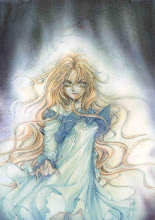Where man's realisation is blurred and dazed
When blue, black, gold and hazel eyes try to look to the sun and find only dark clouds
When the boat shakes violently and the sailors clutch their crucifixes to their hearts.....
I smile, amused by their clumsy ways.
I laugh, tickled by their uncouth prayers
I clap, enjoying the show they put on before me...
I enjoy this little game so much
Everyday, everyday, when the sailors come to my kingdome to seek my treasure
I call the winds to dance and the sea to swirl
Foolish little men, don't you realise...
That who I am? That you cannot defeat me?
Do you not know who I am?
"Dear child..." I hear Father's voice and look up.
"Do you play yet again?" He asks.
"Yes, Father.." I smile. "I am enjoying myself."
<

2 comments:
this is better dan the 1st post!
well done!
The author begins this poem by first stating the setting as “the sea of abstract misunderstanding”. This initially, in my mind, raise images of an actual sea, wrecked with turbulent waves and tempestuous weather. Because “abstract misunderstanding” can easily be linked to chaos and confusion, I think that this is a good analogy to build the poem up from.
In this “sea” it is stated that people are incapable of understanding what’s around them. There is a cryptic reference to specific and peculiar eye colors, ones that may be paired together and maybe scene as polar opposites. That being blue and black (darker colors) juxtaposed with gold and hazel (lighter). I would give the guess that this may be a reference to the differences among people, some see the world in darker tones while others lighter. These eyes cannot find perceive anything other than chaos and sorrow (dark clouds) and the sun (order? Meaning?) is absent.
Those who traverse this ‘sea’, those who are confused, desperately seek solace in hope (crucifixes.)
The narrator begins every line in the next stanza with a word suggesting pleasure in the misfortune of the sailors: smile, laugh, clap, enjoy. The narrator views these ‘sailors’ with amusement and has no pity whatsoever.
Next, the narrator relates how on a steady basis these ‘sailors’ hassle their kingdom, yet in apparent ignorance or disregard for the immutable power of the narrator. Apparently the narrator also possess some treasure that these sailors would take for themselves. This revealing of attempts to steal would explain the callousness the narrator has towards the sailors.
At the end, it is revealed that while the narrator is an being of power, there is one who possess a higher status, the Father. The Father possesses an heir of either dismay or surprise when he finds that his child is ‘playing again.‘ To this the narrator responds with enthusiasm, stating how playing with the sailors is what makes him/her happy. To this I would assume that the narrator has some control over the elements and is tormenting the sailors as they traverse the sea.
Now, this is a cool poem. Yet there are parts where Im uncertain whether it’s meant to be taken as literal, in the case of a story, or that it has metaphoric meaning. Of course both may co-exist, I find that a lot images and symbols are created and yet not developed enough through the course of the poem. The two major being the sea and the sailors are represented the most, yet there is something lost to the whole meaning of this work when the numerous other images are not elaborated on. Examples are the eye colors, the kingdom, the treasure, and the Father. I feel as though these devices could be better employed with additions to the poem and could strengthen the appeal to the reader.
Also, I I would like to note that the words ‘realise’ and ‘kingdome’ are necessarily typos, and yet it seems as though they are obviously done. I have nothing against such sound manipulation with letters, it’s meant to be done by poets- try reading anything by Robert Burns and ruin a whole generation if you teach it to a kindergarten class! I think that doing this would make the words sound like “real-lice” and “king-dome”. This method of using unorthodox spelling can create a rhyme or rhythm scheme and may enhance the enjoyment of the reader if he/she is willing to tolerate unorthodox spellings. I like it.
Post a Comment